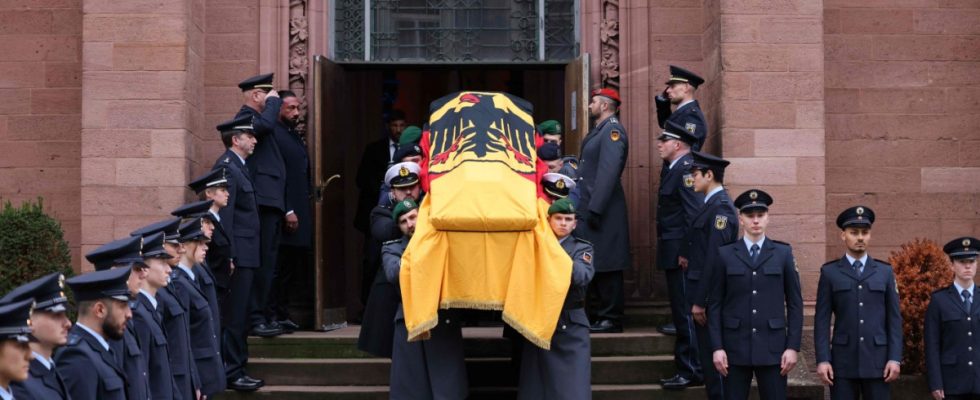At Christmas, Wolfgang Schäuble came once again to the Evangelical City Church in Offenburg, to his church. He sang along vigorously to “O you cheerful”. The next day there was saddle of venison with spaetzle, like every year, with the beloved Baden pinot noir. Schäuble divided his forces carefully, said his daughter Christine Strobl at the funeral. “The dad” didn’t look distressed in the photos. Despite all the effort it must have cost him.
On Friday morning, funeral wreath after funeral wreath is lined up in front of the town church, arranged according to the rank of state office. On the far left is the Federal President, then the President of the Bundestag, then the Chancellor. In the church, in front of the altar, there is a coffin wrapped in a German flag. Next to it is a portrait: Wolfgang Schäuble, smiling mischievously.
Norbert Lammert says he never experienced the Bundestag without Schäuble
A city, a country says goodbye to a great statesman. A gray sky stretches over Offenburg, Schäuble’s hometown in Baden. The people here voted him into the Bundestag as a direct candidate for the CDU 14 times in a row. Half a century as a member of parliament – it felt like he was always there. “I have never experienced the German Bundestag without Wolfgang Schäuble,” says Norbert Lammert, Schäuble’s predecessor as Bundestag President, before entering the church where the service is about to begin.
The Evangelical City Church is a rather small building made of red brick, but the density of political celebrities there has rarely been greater. Bundestag President Bärbel Bas (SPD) is there, as are Baden-Württemberg’s Prime Minister Winfried Kretschmann (Greens), CDU Chairman Friedrich Merz, and Interior Minister Nancy Faeser (SPD). There are also numerous Christian Democrats, from Jens Spahn to Paul Ziemiak.
Schäuble influenced him and an entire generation of CDU MPs, says CDU leader Friedrich Merz in his funeral speech.
(Photo: Philipp von Ditfurth/Reuters)
Of course, it’s noticeable who didn’t come: Angela Merkel, for example, the former chancellor with whom Schäuble had a complicated, ambivalent relationship. Merkel is scheduled to attend the official state ceremony in Berlin on January 22nd. A prominent CSU representative is also missing, which could have something to do with the fact that Schäuble prevented Markus Söder from becoming a candidate for chancellor before the last federal election. Armin Laschet, on the other hand, the hapless candidate, is sitting on one of the church pews.
When he could no longer hike, he set off on his handbike
What kind of person and what kind of politician Schäuble was has been read in detail over the past few days. Even the younger generation, who were only able to follow the later stages of his career, now know everything about Schäuble’s enormous contributions to Europe, to German unity – and know about his famous speech, which made a decisive contribution to Berlin becoming the capital of this united Germany. Everyone who wrote obituaries for him agreed on this: With Schäuble, a great political figure has passed away.
In the church this life is intensified once again. The Protestant regional bishop of Baden devotes herself to the tragic part. In 1990, a mentally disturbed man shot Schäuble at a campaign event. Since then, he, who loved hiking and playing tennis, has been in a wheelchair. “Wolfgang Schäuble did not allow himself to be stopped in his life,” says the regional bishop. And so, after the attack, he continued to explore the hills of the Black Forest, only no longer as a hiker, but on his handbike. That’s what Schäuble’s life was: a lesson in living on.
The obituaries of the past few days have also addressed the question of whether Schäuble’s political career was unfinished. Because he was never chancellor, never federal president. For Friedrich Merz, who saw Schäuble as one of his most important confidants, this question does not arise. In his eulogy, he placed Schäuble “in the front row of the not very large number of German post-war politicians who literally wrote our history.” Not only during reunification, but also in the national debt crisis or with the first Islamic conference. That he was denied the two highest offices? Not important, Merz thinks. “He would have filled them both without a doubt.”
He completed the last week of the Bundestag session between two hospital stays
More than 50 years in the German Bundestag, almost two decades as Federal Minister, later as President of the Bundestag. Schäuble influenced an entire generation of CDU MPs, says Merz – including himself. He was a role model because of his will to be confident, his willingness to take responsibility, and his refusal to give in to fatalism. Merz says: “Wolfgang, you have achieved great things. And it turned out well.”
When the service is almost over, Christine Strobl, Schäuble’s eldest daughter, steps up to the microphone. She talks about Schäuble’s last days. How he went to the hospital in Heilbronn twice for a week in December. How he completed the last week of sessions in the Bundestag in between – because for him it was “not conceivable any other way”. And how he told her at some point on the phone that he couldn’t take it anymore. To the general astonishment of the hospital staff, he finally pulled himself together again for this last Christmas with his family.
Then the mourners stand up. Soldiers carry the coffin out of the church and the band plays the national anthem. The funeral procession to Offenburg’s Waldbach cemetery, where Schäuble will be buried, begins to move. It is the great military escort of honor after a great life.

